-
ORIGINAL ARTICLE12-04-2023
“Fala-M@no-COVID-19”: technological development of a health navigation program for men during the pandemic
Revista Brasileira de Enfermagem. 2023;76(6):e20220534
Abstract
ORIGINAL ARTICLE“Fala-M@no-COVID-19”: technological development of a health navigation program for men during the pandemic
Revista Brasileira de Enfermagem. 2023;76(6):e20220534
DOI 10.1590/0034-7167-2022-0534
Views0See moreABSTRACT
Objective:
to develop a care-educational technology similar to a health navigation program for men during the COVID-19 pandemic.
Methods:
a methodological and qualitative study of a care-educational technology of health navigation program, structured by Program Development Cycle, with 16 patient navigators and 10 professional navigators. It used reflective thematic content analysis and an adaptation model for data processing.
Results:
the ; navigation program was developed by: I) Observation of reality, problem mapping, needs assessment: content selection, creation of domains and questions; II) Theoretical-conceptual and methodological definition, creation of product under the elaboration of care plans, based on theory, process and taxonomies by a flowchart of operationalization of actions; and III) Self-assessment: qualitative research with professional navigators.
Final considerations:
the technology developed, with theoretical and methodological support, allowed to derive a viable navigation program compatible with reality based on the audience’s needs.
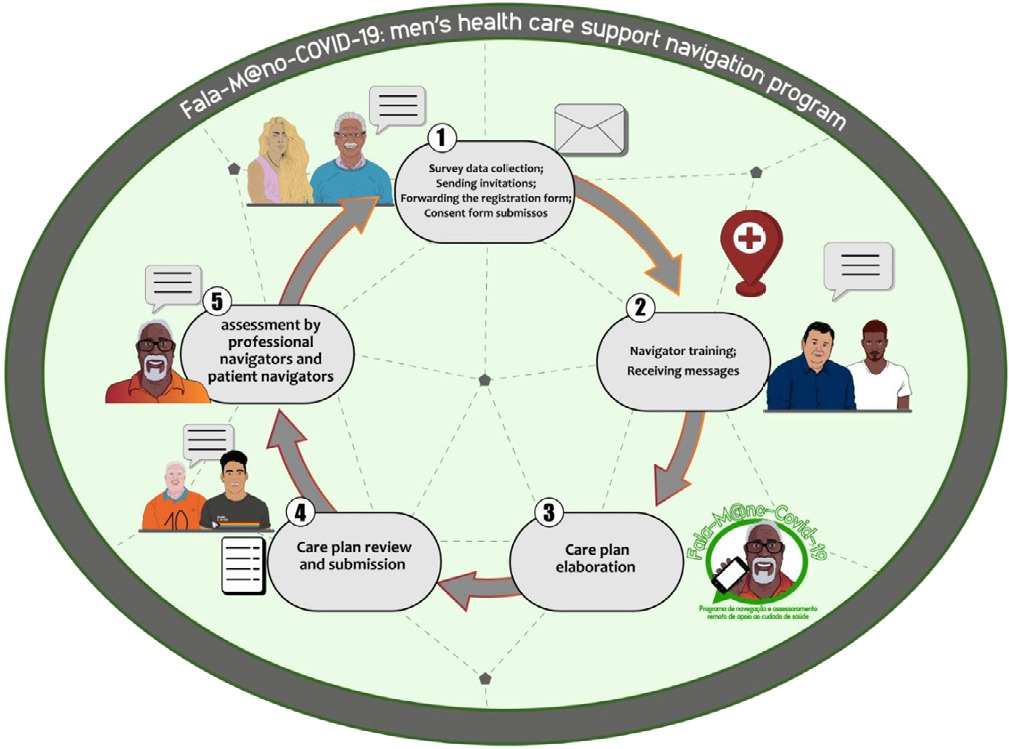
-
ORIGINAL ARTICLE12-04-2023
Social representation of young people in higher education about sexually transmitted infections
Revista Brasileira de Enfermagem. 2023;76(6):e20220406
Abstract
ORIGINAL ARTICLESocial representation of young people in higher education about sexually transmitted infections
Revista Brasileira de Enfermagem. 2023;76(6):e20220406
DOI 10.1590/0034-7167-2022-0406
Views0See moreABSTRACT
Objective:
to analyze the social representations about sexually transmitted infections elaborated by undergraduate students.
Methods:
a descriptive, qualitative study, in the light of the structural approach of Social Representation Theory, carried out with 160 young undergraduate students, in the second half of 2019, in the city of Rio de Janeiro. Data were collected using a sociodemographic characterization questionnaire, knowledge and practices for preventing sexually transmitted infections, analyzed using descriptive statistics and a form of free evocations with the inducing term STD, analyzed using prototypical and similarity analysis.
Results:
the representation’s possible central nucleus is composed of lexicons aids, disease and HIV; the peripheral system by syphilis, sex, condoms, gonorrhea, prevention, infection, carelessness, HPV, herpes, ignorance, treatment, fear, unprotected-sex and danger.
Final considerations:
social thinking about sexually transmitted infections is characterized by their recognition as diseases, which require barrier prevention measures, associating with unsafe sexual practices that arouse fear.

-
12-04-2023
The Medical Healing of Souls: a strategy for welcoming post-pandemic mental health
Revista Brasileira de Enfermagem. 2023;76(6):e20220331
Abstract
The Medical Healing of Souls: a strategy for welcoming post-pandemic mental health
Revista Brasileira de Enfermagem. 2023;76(6):e20220331
DOI 10.1590/0034-7167-2022-0331
Views0See moreABSTRACT
Objective:
to reflect on the applicability of the Medical Healing of Souls (MHS) by health professionals as a welcoming strategy in post-pandemic mental health.
Methods:
a theoretical and reflective study, based on Viktor Frankl’s philosophy, based on the book “The Doctor and the Soul, From Psychotherapy to Logotherapy” and scientific literature.
Results:
the study was structured in two discursive approaches: MHS in the field of health; The applicability of MHS in post-pandemic mental health care.
Final considerations:
MHS can be used in mental health care, in health emergencies, promoting a more humane performance of health professionals, facilitating the integration of inevitable suffering into a meaningful life.
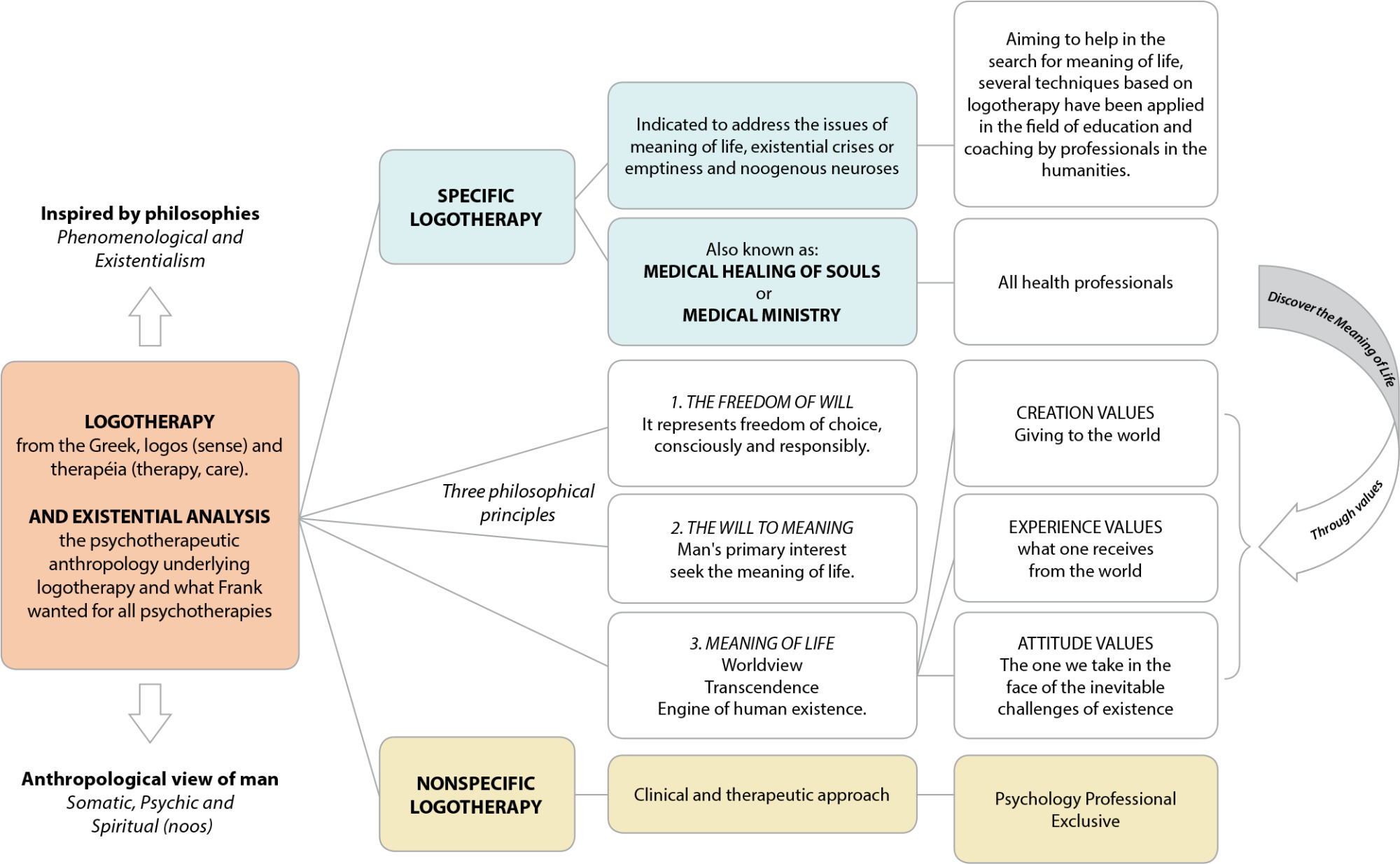
-
ORIGINAL ARTICLE12-04-2023
Translation, cross-cultural adaptation and validity study of the “Play Nicely Program: The Healthy Discipline Handbook” for use in Brazil
Revista Brasileira de Enfermagem. 2023;76(6):e20220281
Abstract
ORIGINAL ARTICLETranslation, cross-cultural adaptation and validity study of the “Play Nicely Program: The Healthy Discipline Handbook” for use in Brazil
Revista Brasileira de Enfermagem. 2023;76(6):e20220281
DOI 10.1590/0034-7167-2022-0281
Views0See moreABSTRACT
Objective:
to describe the translation, cross-cultural adaptation and validity process of the “Play Nicely Program: The Healthy Discipline Handbook” for use in Brazil.
Methods:
a methodological study that followed the translation, back-translation, expert committee assessment, and pre-test steps. The Content Validity Index (CVI) was calculated for both the judge population and the pre-test population. Four translators, seven expert judges in the field of child health and thirty participants in the pre-test, including parents, teachers and healthcare professionals, participated in the study.
Results:
in experts’ analysis (98.4%), a value of 100% of adequate assessments was obtained, and in the target population’s analysis (89.5%), there were 100% of adequate assessments. In both analyses, suggested adaptations were made.
Conclusios:
cross-cultural adaptation and content validity into Brazilian Portuguese of the “Play Nicely Program: The Healthy Discipline Handbook” were considered adequate for application in the target population.

-
ORIGINAL ARTICLE12-04-2023
Assessment of the components of sarcopenia and quality of life perceived of individuals on hemodialysis
Revista Brasileira de Enfermagem. 2023;76(6):e20220677
Abstract
ORIGINAL ARTICLEAssessment of the components of sarcopenia and quality of life perceived of individuals on hemodialysis
Revista Brasileira de Enfermagem. 2023;76(6):e20220677
DOI 10.1590/0034-7167-2022-0677
Views1See moreABSTRACT
Objectives:
to evaluate the prevalence of sarcopenia in individuals aged 50 years or older on hemodialysis; to verify the association between sarcopenia and sociodemographic, clinical, anthropometric factors, components of sarcopenia and quality of life (QoL); and to correlate the components of sarcopenia with QoL.
Methods:
Participated 83 individuals on hemodialysis. Sarcopenia was established according to the current European consensus. Dynamometry to determine strength, calf circumference (CC) and appendicular skeletal muscle mass index (ASMMI) to obtain muscle mass and gait speed (GS) for physical performance. For QoL used the WHOQOL-bref.
Results:
the prevalence of sarcopenia was 32.6% (CC) and 18.1% (ASMMI). There was no association between sarcopenia and QoL. Both handgrip strength (r=0.25) and GS (r=0.36) showed a correlation with physical domain.
Conclusions:
sarcopenia was expressive, and the aspects of functionality determine the physical impairment in this population.
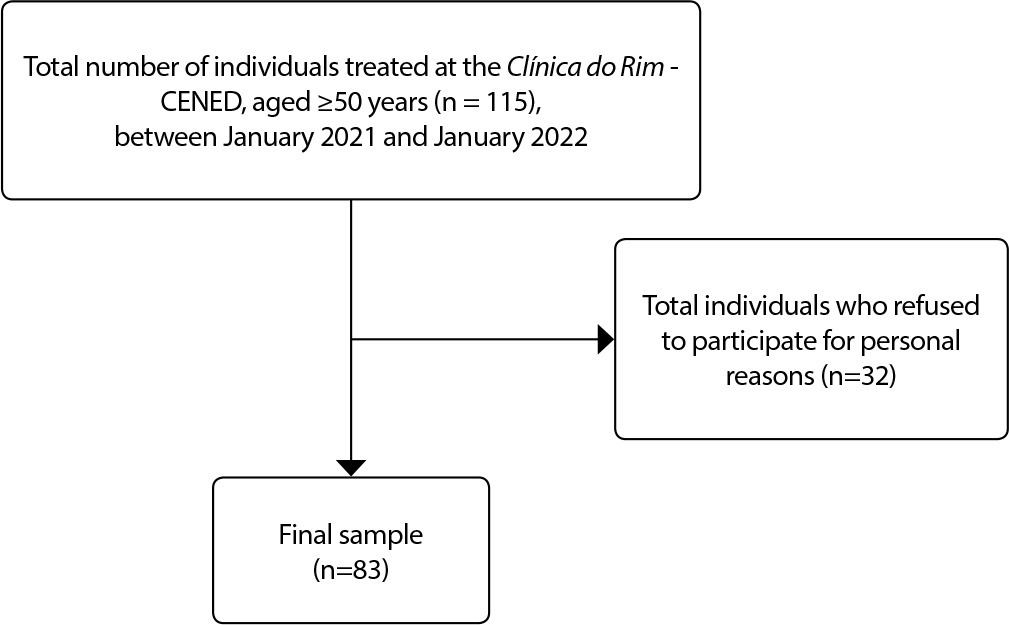
-
ORIGINAL ARTICLE12-04-2023
Effects of auriculotherapy on anxiety and biomarkers in Primary Health Care: a clinical trial
Revista Brasileira de Enfermagem. 2023;76(6):e20220728
Abstract
ORIGINAL ARTICLEEffects of auriculotherapy on anxiety and biomarkers in Primary Health Care: a clinical trial
Revista Brasileira de Enfermagem. 2023;76(6):e20220728
DOI 10.1590/0034-7167-2022-0728pt
Views0See moreABSTRACT
Objective:
to assess the effects of auriculotherapy on anxiety and brain-derived neurotrophic factor (BDNF), neuron-specific enolase (NSE) and S100 calcium-binding protein B (S100B) serum levels in adults assisted in Primary Health Care.
Methods:
a pre-experimental pilot clinical trial. Information was obtained from 19 patients using the State-Trait Anxiety Inventory (STAI) and analysis of BDNF, NSE and S100B serum levels.
Results:
the pre-intervention anxiety score in the IDATE-Trait was 52.11±6.691 (CV 12.84%) and the assessment after auriculotherapy was significantly lower (43.72±8.141; CV 18.62%; P=0.0007). S100B levels were significantly reduced after auriculotherapy (from 64.03±72.18 to 54.03±68.53 pg/mL; CV 126.8%; P=0.0023).
Conclusion:
auriculotherapy effectively reduced anxiety levels. It proved to be safe and easy to apply, allowing nurses to perform this technique autonomously. A reduction of S100B was also evidenced, demonstrating possible prevention of neuronal damage.
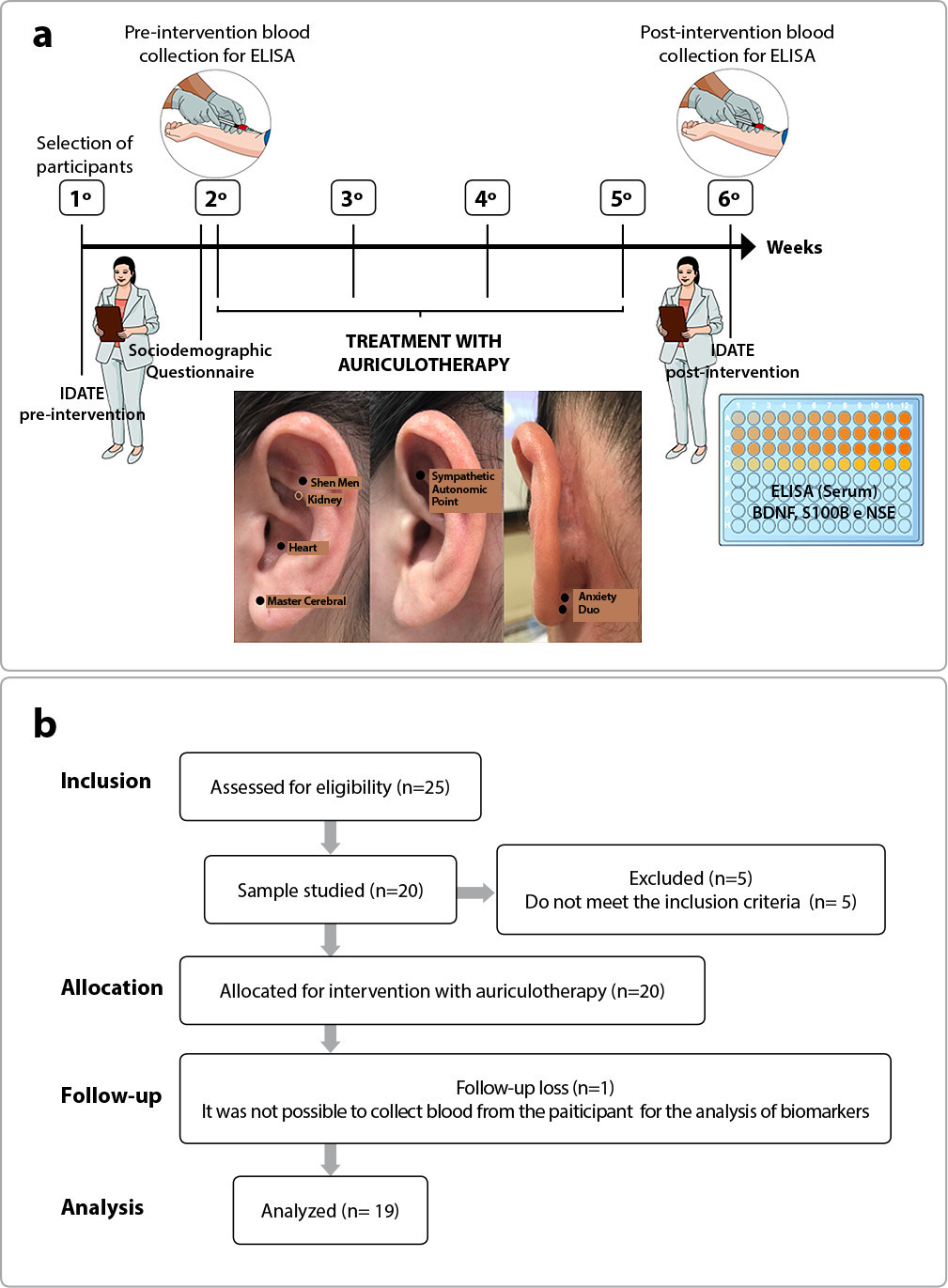
-
ORIGINAL ARTICLE12-04-2023
Leadership Competencies of the Medical-Surgical Nursing Specialist Nurse
Revista Brasileira de Enfermagem. 2023;76(6):e20220721
Abstract
ORIGINAL ARTICLELeadership Competencies of the Medical-Surgical Nursing Specialist Nurse
Revista Brasileira de Enfermagem. 2023;76(6):e20220721
DOI 10.1590/0034-7167-2022-0721
Views0See moreABSTRACT
Objective:
To identify the leadership competencies of Medical-Surgical Nursing Specialist Nurses.
Methods:
A quantitative, descriptive study using the Leadership Competencies Questionnaire. 311 Portuguese Medical-Surgical Nursing Specialist Nurses participated. Data analysis involved descriptive and inferential statistical analysis using the Statistical Package for Social Sciences (SPSS), version 22.0.
Results:
Study participants had an above-average self-perception on the scale (mean = 3.5) in all leadership roles, recognizing their leadership competencies. The leadership competencies of Medical-Surgical Nursing Specialist Nurses are balanced across all roles: Mentor (5.80 ± 1.02); Coordinator (5.53 ± 0.86); Facilitator (5.38 ± 1.04); Innovator (5.34 ± 0.88); Director (5.31 ± 1.10); Producer (5.30 ± 0.98); Monitor (5.15 ± 1.00); Corrector (4.79 ± 1.29)
Conclusions:
Specialized nursing practice enhances nurses’ self-perceived leadership competencies. Nurses see themselves as leaders focused on internal support and facilitation of collective effort and opportunities for skill development.
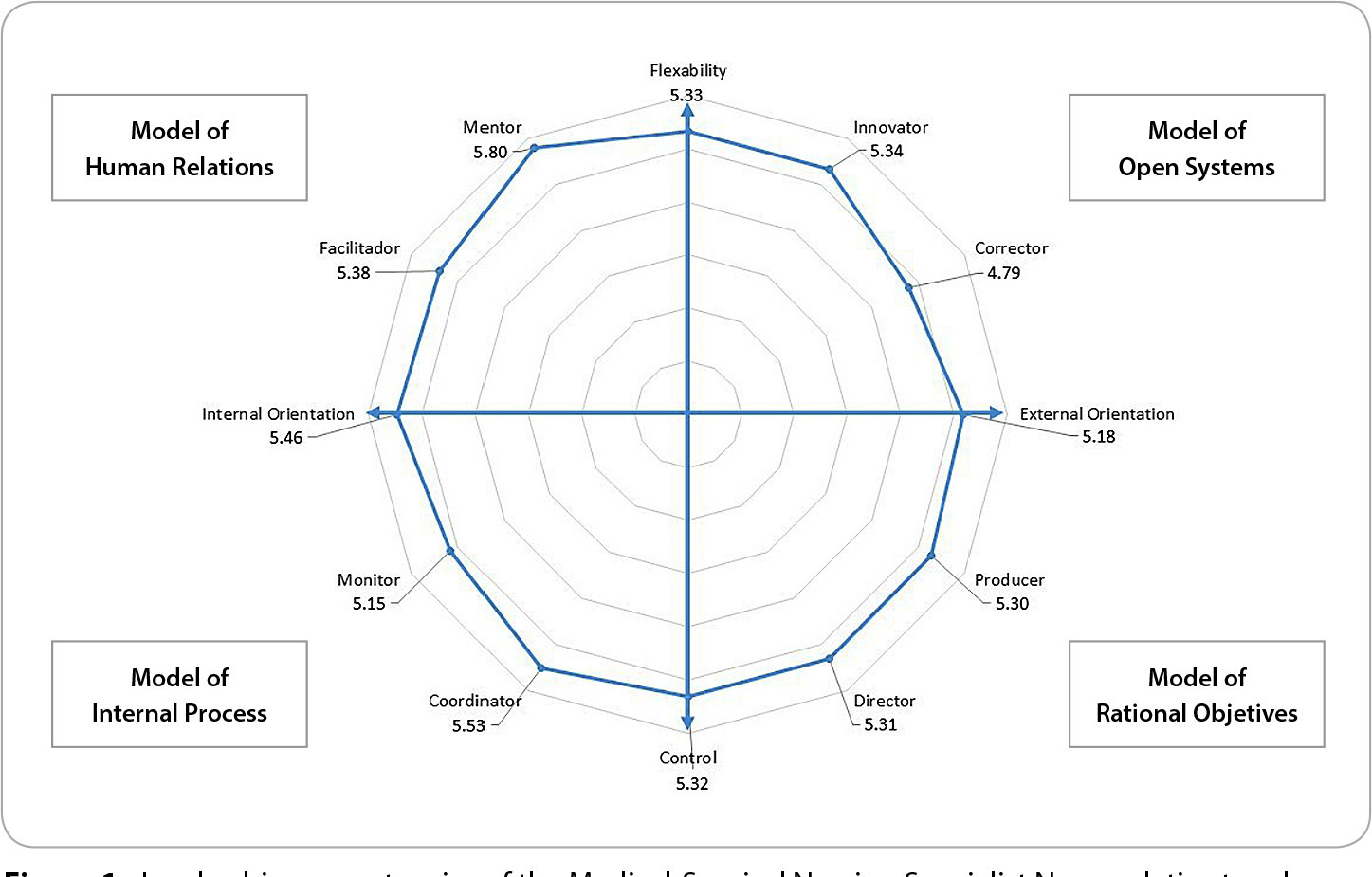
-
ORIGINAL ARTICLE12-04-2023
Feelings about birth by a group of high-risk pregnant women
Revista Brasileira de Enfermagem. 2023;76(6):e20230059
Abstract
ORIGINAL ARTICLEFeelings about birth by a group of high-risk pregnant women
Revista Brasileira de Enfermagem. 2023;76(6):e20230059
DOI 10.1590/0034-7167-2023-0059
Views0See moreABSTRACT
Objective:
to understand feelings about birth among a group of high-risk pregnant women.
Method:
a descriptive and qualitative study, using Alfred Schütz’s social phenomenology as a philosophical theoretical framework. The study included 25 pregnant women undergoing high-risk prenatal care. The interview had the following guiding questions: tell me about your feelings regarding the moment of birth/childbirth; How do you deal with the high-risk diagnosis? What are your expectations for birth/childbirth?
Results:
five categories emerged: Fear of obstetric care; Fear of complications with the baby; Fear of cesarean section; Resilience in the face of high-risk pregnancy; and Expectations for birth.
Considerations:
high-risk pregnant women are afraid of the care they will receive, the risks and concern about the baby’s vitality at birth. The importance of care is emphasized, with a welcoming environment, bonding and communication between health team and pregnant woman.
-
ORIGINAL ARTICLE10-05-2020
Professional master program: Preparing the nurse of the future
Revista Brasileira de Enfermagem. 2020;73:e20200007
Abstract
ORIGINAL ARTICLEProfessional master program: Preparing the nurse of the future
Revista Brasileira de Enfermagem. 2020;73:e20200007
DOI 10.1590/0034-7167-2020-0007
Views0See moreABSTRACT
Objective:
Analyze the results of knowledge production from a graduate program for master’s degree in nursing.
Method:
This is a qualitative retrospective documentary study. Data were collected from the university library repository and the program website. In total, 83 dissertations were found, analyzed and arranged into five groups: worker’s health, care management, systematization of nursing care, health education, and nursing care.
Results:
The results indicate good practices such as manuals, guides, protocols, software, and products for systematization of care. They indicate concern about changing the reality with care practices and interventions, health education and continuing education.
Final considerations:
This study showed student commitment to the fields of practice when choosing the project theme. Students presented an intention to improve care, management, education and research, in the various dimensions of the profession.
-
ORIGINAL ARTICLE12-07-2020
Construction and validation of an educational gerontotechnology on frailty in elderly people
Revista Brasileira de Enfermagem. 2020;73:e20200800
Abstract
ORIGINAL ARTICLEConstruction and validation of an educational gerontotechnology on frailty in elderly people
Revista Brasileira de Enfermagem. 2020;73:e20200800
DOI 10.1590/0034-7167-2020-0800
Views0See moreABSTRACT
Objective:
to construct and validate an educational gerontechnology on frailty in elderly people.
Method:
a methodological study developed in three stages: educational video construction, validation by expert judges and elderly people. Validation was carried out by 22 judges and 22 elderly people. Educational Content Validation Instrument was used for judges and questions adapted from the Suitability Assessment of Materials questionnaire for elderly people. For validation, agreement criterion greater than 80% was considered, verified using Content Validation Index and binomial test.
Results:
the video addresses recommendations for elderly people at risk of frailty and health-promoting habits, using cordel literature. An agreement greater than 80% was verified in all items assessed by judges and the target audience.
Conclusion:
the video proved to be valid in terms of content and appearance by judges and elderly people, with the potential to mediate health-promoting educational practices in healthy aging.

-
ORIGINAL ARTICLE07-06-2020
Vulnerability in the health of young transgender women living with HIV/AIDS
Revista Brasileira de Enfermagem. 2020;73(5):e20190046
Abstract
ORIGINAL ARTICLEVulnerability in the health of young transgender women living with HIV/AIDS
Revista Brasileira de Enfermagem. 2020;73(5):e20190046
DOI 10.1590/0034-7167-2019-0046
Views0See moreABSTRACT
Objectives:
to analyze the health vulnerability of young female transgender living with HIV/AIDS.
Methods:
qualitative, descriptive, and exploratory study, based on the theoretical reference of Social Representation and concept of vulnerability; developed with six transgender women in a reference Hospital for HIV/AIDS. We analyzed the individual interviews, recorded, and transcribed in full, in the IRaMuTeQ software by Similitude Analysis.
Results:
the thematic categories are listed based on the Ayres reference: 1) Individual dimension of vulnerability to HIV/AIDS; 2) Social dimension of vulnerability to HIV/AIDS; 3) Programmatic dimension of the vulnerability.
Final Considerations:
the young female transsexual living with HIV/AIDS experience a context of vulnerability in health associated with a lack of knowledge and difficulties for the realization of self-care. The study evidenced the representations of social abjection and unpreparedness of the health team that compose the Primary Attention in Health in promoting qualified assistance for the execution of the effective and humanized care.
-
EXPERIENCE REPORT07-31-2020
(In)visibility of children with special health needs and their families in primary care
Revista Brasileira de Enfermagem. 2020;73:e20190071
Abstract
EXPERIENCE REPORT(In)visibility of children with special health needs and their families in primary care
Revista Brasileira de Enfermagem. 2020;73:e20190071
DOI 10.1590/0034-7167-2019-0071
Views0See moreABSTRACT
Objectives:
to discuss the (in)visibility of children with special healthcare needs and their families in the Primary Health Care scenario.
Methods:
experience report about the difficulties faced by researchers from different regions of Brazil to locate children with special healthcare needs in the scope of primary care.
Results:
the main reason for these children and their families to be “unknown” and, therefore, not assisted in PHC, is the fact that they are followed-up by institutions/outpatient clinics and specialized and/or public rehabilitation clinics, or even because they have private health insurance.
Final Considerations:
transferring care responsibility to the Primary Health Care teams to specialized and rehabilitation institutions may be related to the lack of knowledge of the care demands of this group, as well as to the relevance of care centered on rehabilitation and the specialty instead of the long-term care, one of the features of primary health care.
-
03-19-2021
Validity and reliability of Kessler Psychological Distress Scale for Brazilian elderly: a cross-sectional study
Revista Brasileira de Enfermagem. 2021;74:e20200365
Abstract
Validity and reliability of Kessler Psychological Distress Scale for Brazilian elderly: a cross-sectional study
Revista Brasileira de Enfermagem. 2021;74:e20200365
DOI 10.1590/0034-7167-2020-0365
Views0See moreABSTRACT
Objective:
to verify the validity and reliability of the Psychological Distress Scale for screening mental distress.
Methods:
a cross-sectional study with 75 elderly people. Psychological Distress scale and Self Reporting Questionnaire were used. Criterion validity was verified using Spearman’s correlation and diagnostic accuracy measures. Cronbach’s alpha coefficient was used to investigate reliability.
Results:
the total internal consistency of the Psychological Distress Scale was α=0.844. Concurrent validity between this instrument and the Self Reporting Questionnaire was ρ=0.722 (p<0.001). The best cut-off point for screening mental distress among elderly people was a total score greater than 14, with sensitivity equal to 75.47% and specificity equal to 85.0%.
Conclusions:
the scale was robust for screening mental distress, given its high reliability, in terms of homogeneity, and adequate criterion validity, whose best cut-off point for screening was a score greater than 14.
-
ORIGINAL ARTICLE10-21-2019
Hand hygiene: knowledge and skill of caregivers in the hematopoietic stem cell transplantation
Revista Brasileira de Enfermagem. 2019;72(6):1653-1662
Abstract
ORIGINAL ARTICLEHand hygiene: knowledge and skill of caregivers in the hematopoietic stem cell transplantation
Revista Brasileira de Enfermagem. 2019;72(6):1653-1662
DOI 10.1590/0034-7167-2018-0788
Views0See moreABSTRACT
Objective:
to identify the knowledge and ability of caregivers on hand hygiene in hematopoietic stem cell transplantation.
Method:
a prospective cross-sectional study. A questionnaire was used to identify the knowledge and it was observed the hygiene technique performance. Data were collected in two units (autologous and allogeneic transplant).
Results:
the 37 participants recognized the importance of hand hygiene and 95.5% related to removal of dirt or infection prevention. 91.9% stated that it was important to clean their hands with soap and water when entering and leaving the room, and 64.9% understood that it was necessary to apply alcoholic solution after washing. On average, the caregivers scored 6.16 steps, when demonstrating the washing technique and 3.91 steps in the friction with alcoholic solution.
Conclusion:
although they recognize the importance of the procedure, there are deficits related to the moment and the correct way of doing it, evidencing the need for strategies aimed at improving this process.
-
ORIGINAL ARTICLE07-31-2020
Pain assessment in pediatrics
Revista Brasileira de Enfermagem. 2020;73:e20190109
Abstract
ORIGINAL ARTICLEPain assessment in pediatrics
Revista Brasileira de Enfermagem. 2020;73:e20190109
DOI 10.1590/0034-7167-2019-0109
Views0See moreABSTRACT
Objectives:
to investigate how the pain assessment and management process in pediatric patients is performed and suggestions for its improvement.
Methods:
exploratory, qualitative study. Nine professionals from the nursing team of a pediatric hospital unit in Porto Alegre/RS participated in the study. A sociodemographic questionnaire and semi-structured interviews were used with content analysis.
Results:
the results reinforced the importance of pain assessment with family participation and the need to use tools and process improvements in the training and sensitization of professionals.
Final Considerations:
after the study was concluded, there was a clear need to address the issue, highlighting its relevance for pain resolution in pediatric patients.
-
ORIGINAL ARTICLE10-21-2019
Perception of health professionals about neonatal palliative care
Revista Brasileira de Enfermagem. 2019;72(6):1707-1714
Abstract
ORIGINAL ARTICLEPerception of health professionals about neonatal palliative care
Revista Brasileira de Enfermagem. 2019;72(6):1707-1714
DOI 10.1590/0034-7167-2018-0842
Views0See moreABSTRACT
Objective:
To identify the perception of health professionals about neonatal palliative care.
Method:
A phenomenological qualitative study, a non-probabilistic sample, of 15 health professionals from a neonatal intensive care unit in northern Portugal. Content analysis was performed.
Results:
Despite their lack of training in palliative care, the health professionals showed concern for the dignity, quality of life and comfort of the newborn and family. They expressed emotional and relational difficulties in following the trajectories of serious illness and death and in the ethical decisions regarding the end-of-life.
Conclusion:
It is emphasized that professionals are sensitive to pain and suffering and reveal dedicated and committed in the care of the newborn and family. They are available to train and embrace the current challenges posed by the constitution of pediatric palliative care teams and to help achieve an organizational culture that advances in such care.
Search
Search in:
Nuvem de Tags
Adolescente (85) Atenção Primária à Saúde (239) COVID-19 (91) Criança (91) Cuidados de Enfermagem (269) Educação em Enfermagem (151) Educação em Saúde (139) Enfermagem (930) Enfermagem Pediátrica (86) Estudantes de Enfermagem (77) Estudos de Validação (131) Família (87) Idoso (208) Promoção da Saúde (99) Qualidade de Vida (104) Saúde do Trabalhador (86) Saúde Mental (145) Saúde Pública (82) Segurança do Paciente (150) Tecnologia Educacional (100)



